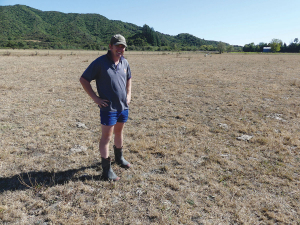Primary sector on alert as red rain warnings issued across multiple regions
Agriculture and Forestry Minister Todd McClay is encouraging farmers and growers to stay up to date with weather warnings and seek support should they need it.
 Golden Bay Federated Farmers President Wayne Langford says the top-of-the-South drought is starting to bite.
Golden Bay Federated Farmers President Wayne Langford says the top-of-the-South drought is starting to bite.
Farmers across the top of the South Island are pinning their hopes on forecast rain to ease a drought some say is shaping up as the worst since 2001.
Pastures were tinder-dry across the top of the South, contributing to the huge wildfire near Nelson.
Irrigators’ allocations are cut, townies are conserving water and travellers are getting ‘sorry’ notes about their unwashed rental cars.
“It’s not yet an official drought but it won’t be long before we’re starting to have those talks,” said Takaka dairy farmer and Golden Bay Federated Farmers president Wayne Langford.
Local farmers have already had one drought meeting with DairyNZ and another is scheduled for February 28.
“We’re all hoping [for] rain before then. If [not] we won’t have seen rain all month,” said Langford. “That’s when pretty drastic decisions will be made; we’ll start talking about drying-off early.”
But as Dairy News goes to print fronts are seen as possible from the west and tropical cyclone Oma could bring rain from the east.
Langford, from a long-established Golden Bay farming family, milks 250 cows on his unirrigated 93ha a few km south of Takaka. The last rain it had was just 6mm in January.
He uses a summer crop of lucerne as a way of “putting green in front of the cows” but even lucerne is struggling in the heat.
Langford said most of the district’s dairy farmers are already on once-a-day milking. The only farmer at the meeting still milking twice a day is on irrigated land but irrigation was close to shut-off as the Takaka River flows dwindled.
Langford noted the district’s good spring, but even so the ground was only wet on top with nothing underneath.
“The fortunate thing about our spring was we continued to get small rain events -- 20-25mm -- almost weekly or more. But we didn’t get the 100 - 200mm rain common in Golden Bay; we haven’t had one of those since July.”
Amanda Tait, sharemilking 340 cows with her husband Richard just north of Takaka township, says they hope to keep milking “at the moment” but are expecting a huge loss of production.
“There’s just no grass. I went walking around yesterday and it just shocks you; even the weeds are dying.”
Tait said they had decided to let a worker go, and she will go back to work to make ends meet. “We have to do something.”
They were also culling their empties far earlier than usual. “We sent 25 cows away yesterday, so that’s pretty heartbreaking because we don’t send them till the end of the season. We don’t send them all in one go.”
The Taits have some irrigated paddocks but they are just “keeping green” and not growing.
“We’ve got 40ha irrigated but the council shut us down to 50%
the other day so that’s dire.”
Paddocks that haven’t responded well have been shut off to keep remaining water for the paddocks that appear to be doing OK.
Their last rain was Christmas day “and that wasn’t really rain,” said Tait.
Even with rain it will take at least a month for things to start growing again.
Agriculture and Forestry Minister Todd McClay is encouraging farmers and growers to stay up to date with weather warnings and seek support should they need it.
The closure of SH2 Waioweka Gorge could result in significant delays and additional costs for freight customers around the Upper North Island, says Transporting New Zealand.
OPINION: The year has started positively for New Zealand dairy farmers and things are likely to get better.
Ministry for Primary Industries (MPI) Director General Ray Smith believes there is potential for an increase in dairy farming in New Zealand.
New Zealand's new Special Agricultural Trade Envoy, Horowhenua dairy farmer, company director and former Minister of Agriculture, Nathan Guy says the Free Trade Agreement (FTA) with India is a good deal for the country.
New figures show dairy farmers are not only holding on to their international workforce, but are also supporting those staff to step into higher-skilled roles on farm.